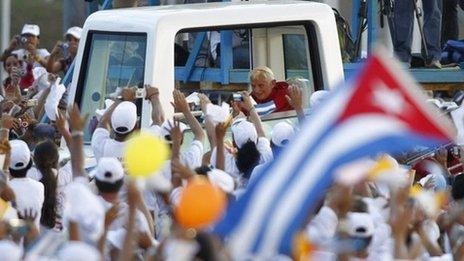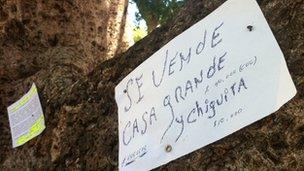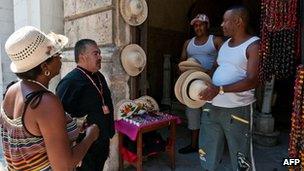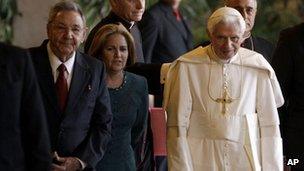Papal visit sparks hope for further change in Cuba
- Published

The small handwritten note tacked onto a tree trunk in central Havana reads "Large house, $40,000, small house $10,000".
In the 14 years since Pope John Paul II visited Cuba there have been many changes, but amongst the most visible ones is the explosion of small-scale private commerce.
Back-street pizza parlours, tailors and builders tout for business with rudimentary hoardings advertising their services. New rules introduced this year allow people to trade property on an open market.
So every Saturday homeowners parade up and down this beautiful tree-lined boulevard buying, selling and swapping houses and apartments.
Cubans are new to the whole property business and as the laws do not allow for estate agents people must take to the streets to make a sale.
It is all very dignified and restrained compared to the cut-throat housing market elsewhere.
People hang rudimentary signs on trees or around their necks and stroll up and down engaging in hushed conversations with potential buyers.
'Shortages'

There have been many changes in Havana since the last papal visit
The market also highlights something else that has changed since the last Papal visit: the deterioration of housing.
Some buildings are in a parlous state of disrepair and others are literally falling into ruin. Large families are forced to cram into dingy single-room apartments with shortages of basic amenities.
The Cuban government blames the punitive US trade embargo. Washington blames the failure of the socialist state.
People are wary of foreigners in Cuba and especially of talking to journalists in the open air. But while we watched the housing market, two men who wanted to talk approached us.
One spoke of shortages of water, electricity and jobs.
He ushered me into the darkened alleyway that lead into an apartment block to illustrate the poverty many Cubans face and whispered conspiratorially that "the government doesn't do anything for us, I can't even buy enough food".
Another told me he was a government worker, supplementing his income by trying to sell a neighbour's house for him.
He was pleased with the new rules and now wanted a lifting of the restriction on travelling abroad. "You can visit my country, why can't I come to visit you in England?" he asked.
He blamed Cuba's superpower neighbour and the blockade for the island's problems, and wanted further changes in the economy, not the political system.
'Tropical communism'
For most Cubans it is the affairs of man not God that occupies their daily routine, but how to get through the day and make ends meet. But there is excitement at Pope Benedict's visit and a hope that it will usher in further change.
The Vatican treads a fine line between advocating change and continuing to build on its working relationship with the church.

Cubans have constitutionally guaranteed freedom of religion, although restrictions remain
For three decades after the revolution the state endorsed atheism and many Catholics were persecuted and fled the island.
But today freedom of religion is guaranteed and in theory Cubans can be a Catholic and a card-carrying member of the Communist Party at the same time, despite the obvious contradictions.
The Church talks about "tropical communism" to differentiate between the atheist Soviet doctrine of the Eastern bloc and the secular system of Cuba.
It is also used to explain the different role of the clergy in trying to bring about change, working from "within".
"In the past everyone was told they were atheist but that isn't in the Cuban culture," says Monsignor Juan De Dios of the Cuban Catholic Conference of Bishops.
"Fortunately the authorities have realised that faith isn't incompatible with being a good human being, it's quite the opposite. So the relationship with the authorities today is much more stable."
'Wrong message'
But the church has been criticised for being too close to the government.
A letter to Pope Benedict XVI signed by 750 activists argued that his visit "would be like sending a message to the oppressors that they can continue to do whatever they want, that the church will allow it".
The Vatican insists that the Pope's visit is not political and that he is unable to meet with dissidents.

Pope Benedict XVI met President Raul Castro (left) on Tuesday
But speaking shortly before arriving in the region Pope Benedict called for freedom of conscience in Cuba, saying: "Marxist ideology as it was conceived no longer responds to reality".
And when he spoke of "new models", it was a thinly-veiled call for further reform.
"The Catholic Church is not on the government's side or the dissident's side; it's on the side of the people," says Monsignor De Dios.
The faithful rallying for mass in Havana on Wednesday must hope and pray that is true and that Pope Benedict's visit will bring the change they so deeply desire a little closer.
- Published25 March 2012
- Published23 March 2012
- Published19 March 2012
- Published22 March 2012